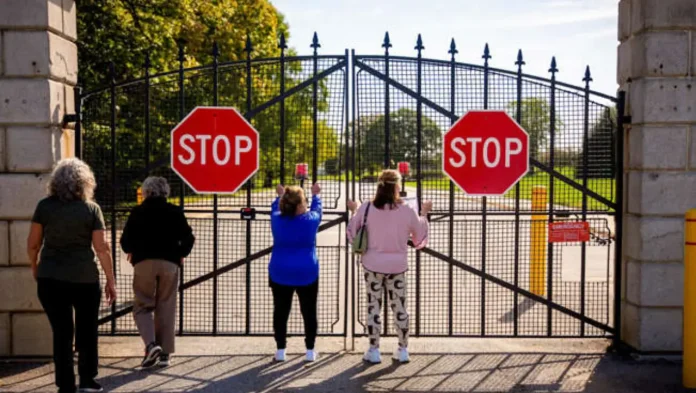The U.S. government shutdown has now stretched into another week, with lawmakers still deadlocked on a funding deal. As the political blame game continues in Washington, millions of Americans are left wondering how the shutdown will impact Social Security benefits, Medicare, Medicaid, federal workers, flights, and national services.
Lawmakers Locked in a Standoff
House Speaker Mike Johnson and House Minority Leader Hakeem Jeffries appeared on NBC’s Meet the Press on Sunday to discuss the stalled negotiations. Jeffries stressed that Democrats want bipartisan cooperation to pass a spending bill that protects the Affordable Care Act subsidies and meets the needs of the public.
Meanwhile, Johnson argued that it is up to Senate Democrats, led by Chuck Schumer, to back the House-passed funding bill. However, progress remains unlikely as both parties continue to clash over health care subsidies and Medicaid cuts.
Impact on Federal Workers
According to the Congressional Budget Office, around 750,000 federal employees are currently furloughed, losing an estimated $400 million in daily pay. These workers include staff at national parks, financial regulators, and other agencies.
“Essential” workers, such as military members, law enforcement officers, and airport security staff, are still reporting to duty, but they will not receive paychecks until the shutdown ends.
What Happens Next?
The Senate is expected to vote again on a short-term Republican-backed funding bill. However, without additional Democratic support, the measure is likely to fail. The House, meanwhile, remains out of session until October 13, further delaying any resolution.
Social Security, Medicare, and Medicaid During the Shutdown
The Social Security Administration will continue to issue retirement and disability benefits, though 12% of staff have been furloughed. Marketing campaigns and some administrative services are paused.
Payments under Medicare and Medicaid will continue, ensuring seniors and low-income families maintain coverage. However, Democrats are pushing to restore recent Medicaid cuts and extend Affordable Care Act subsidies, which remain a sticking point in negotiations.
Will Flights Be Delayed?
Air travelers will see minimal disruption during the shutdown. TSA agents, air traffic controllers, and border officers are deemed essential, meaning airports remain operational.
Still, airline groups warn that requiring these workers to operate without pay could eventually strain the aviation system, slow flights, and reduce efficiency if the shutdown drags on.
Student Loans and FAFSA
Borrowers are still required to make payments on their student loans. The Department of Education will continue to disburse Pell Grants and Federal Direct Student Loans. FAFSA processing will also continue, but most Education Department staff are furloughed, meaning delays in customer service and new grant programs.
National Parks and Historic Sites
National parks will remain partially open. Visitors may still access trails, open-air memorials, and some facilities, but services like visitor centers, restrooms, and trash collection will be limited.
Some historic landmarks, including the Statue of Liberty and Ellis Island, may close altogether if the shutdown continues. New York Governor Kathy Hochul warned that Lady Liberty’s torch could literally go dark unless Congress reaches a deal.
IRS and DMV
The IRS will continue operations for now, funded by the Inflation Reduction Act, though the agency has not outlined plans beyond early October.
The Department of Motor Vehicles (DMV) remains unaffected, as it is state-funded and operates independently of federal budget negotiations.
Why the Shutdown?
The core disagreements involve health care subsidies and immigration policy. Republicans argue Democrats want free health care for undocumented immigrants, though experts point out that undocumented migrants are not eligible for Medicare, Medicaid, or ACA-subsidized health plans.
Democrats insist the shutdown stems from Republican cuts to Medicaid and attempts to weaken the Affordable Care Act.
Outlook
Until lawmakers reach a compromise, hundreds of thousands of federal employees will remain furloughed, and essential services will continue under strain. The longer the government shutdown drags on, the more Americans—from retirees depending on Social Security to travelers boarding flights—will begin to feel its impact.
Also Read: Flying Taxis Take Off in the US as Joby and Archer Race to Launch Passenger Flights

